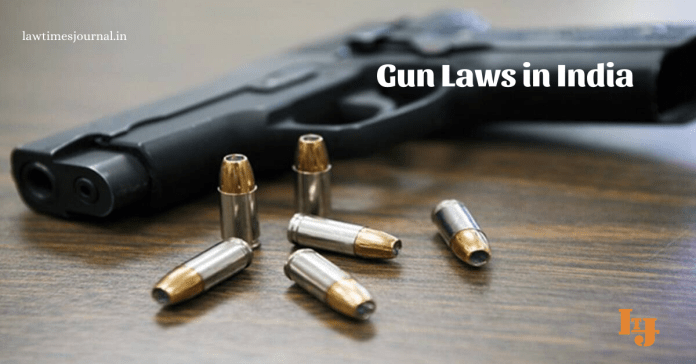Preceding the Indian First War of Independence in 1857, there were hardly any weapon control laws in India. The Indian Arms Act, 1878 was a demonstration controlling the assembling, deal, ownership, and convey of guns. The demonstration incorporated obligatory authorizing to convey a weapon, yet contained avoidances for certain gatherings and people, for example, “all people of Kodava (Coorg) race”.
The possibility of standard residents conveying weapons is conceivable in certain countries, while in different countries; it is confined distinctly to the State. The privilege has been allowed in nations like the United States during that Second Amendment of the Constitution. In the States, residents are permitted to convey arms to protect themselves as a private volunteer army can exist. Be that as it may, the privilege has been confined by ‘firearm control enactments’, which limit the privilege as for certain spots or people. Then again, in India, it isn’t perceived as an established right. The Arms Act puts various obstructions regarding ownership of arms. While keeping weapons might be viewed as essential for an amazing assurance; as of late, the privilege has been abused, as is clear structure expanding pace of wrongdoing executed utilizing exclusive arms. Along these lines, it gets fundamental to evaluate the precepts of the option to remain battle-ready concerning the overarching circumstance.”
The Arms Act of 1959, and the Arms Rules 1962, of India, prohibit the arrangement, manufacture, proprietorship, acquisition, import, fare, and transport of firearms and ammo except if under a grant and is a stringent methodology. Regular citizens with a permit are just permitted to purchase NPB firearms (non-prohibited bore). Non-Prohibited Bore weapons include arms such as- handguns of calibre .35, .32, .22 and .380. All civilians can apply for possession of an NPB by following the due procedure under Chapter II and Chapter III of the Arms Act 1959.[1]
Procedure for applying for a Firearm License in India[2]
- To own a gun in India, a civilian need to be minimum 21 years of age. Weapons are for just three purposes: crop insurance, sport and self-protection. For a self-preservation permit, a regular citizen needs to demonstrate an unavoidable risk to life. Assurance can likewise be from wild creatures.
- Documents required – identity proof, residence proof, proof of age, proof of education, residence proof, 4 photographs, last three years’ income tax returns, character certificate after verification from eminent members in the locality, health certificates both mental and physical.
- Police performing applicant’s strict background check for 2 months.
- The recorded interviews are sent for record keeping to the Criminal Branch and National Crime Record Bureau. It is after this that the authorizing specialists meet the candidate and the purpose behind their endorsement or declining of permit is likewise archived.
- The applicants whose applications are approved must observe mandatory arms handling course whereby they learn safe handling, firing and transporting a gun.
- The license granted must be renewed after every three years
- It is mandatory to carry a gun in a holster or a rucksack in case of rifles
Guns in States – 35,87,016 Arms licenses registered till November 2018 with the MHA Portal.[3]
| States | License per Lakh of Population |
| J&K | 3859 |
| Punjab | 1390 |
| Himachal Pradesh | 1331 |
| Uttar Pradesh | 644 |
| Madhya Pradesh | 356 |
| Karnataka | 192 |
| Maharashtra | 78 |
| Telangana | 25.91 |
| Andhra Pradesh | 12.13 |
| Kerala | 31.73 |
Whoever uses firearms for celebratory gunfire or in a rash and negligent manner shall be punished with two-year imprisonment and a fine up to 1 lakh.
The proposed alterations to Arms Act stipulate prison term that can go up to life imprisonment for ownership of weapons looted “from military or police”, engaged in “illegal dealing”, and rash and careless utilization of guns
In the case of Ganesh Chandra Bhatt v District Magistrate, Almora, Justice Katju[4] held that if an application for a license to bear a non-prohibited weapon is not accepted or rejected in three months, the license is deemed to have been granted by the Government since the right to self-defence has been considered to be within the ambit of Article 21. However, this judgement was passed before the 1993 terror attack in Bombay and since then the judgement has been overruled and as of now the right to bear arms is solely governed by the Arms Act, 1959 and it is not constitutionally protected.
As of present day, the weapon laws in India are one of the most stringent on the planet. In the United States, securing any gun (counting a weapon) is a sacred right, yet in India, it must be named as a benefit. No standard Indian resident can secure a weapon without acquiring a permit from the equipped permitting authority. The changed Arms Rules of 2016, make getting a permit fundamental in any event, for airguns.
“The views of the authors are personal“
Reference
[1] https://www.mensxp.com/mean-machines/epic-weaponry/40558-here-s-how-you-can-get-a-gun-license-in-india.html
[2] https://legaldesire.com/what-are-gun-laws-in-india-how-can-one-get-a-gun-in-india/
[3] https://economictimes.indiatimes.com/news/defence/one-person-one-gun-a-new-firearm-policy-in-the-works/articleshow/71911790.cms







